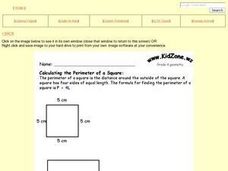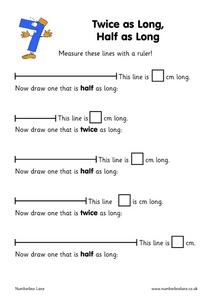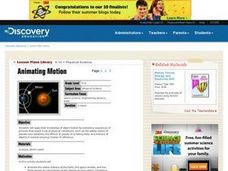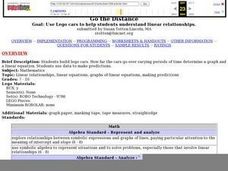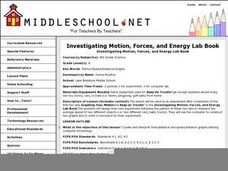Curated OER
How Can Motion Be Described?
In this motion worksheet, students complete a graphic organizer by describing the different ways an object can move: position, distance, direction, and speed.
Curated OER
Calculating the Perimeter of a Square
A quick definition and the formula for finding the perimeter of a square is provided at the top of this worksheet. After reading the description, 4th graders must find the perimeter of the 3 given squares by adding or multiplying. This...
Curated OER
Twice as Long, Half as Long
In this mathematical worksheet, learners measure five lines, record how long they are in centimeters and then draw a line that is half or twice as long as the one they measured.
Curated OER
NASA Search
In this space learning exercise, students identify and locate vocabulary terms related to NASA and space. There are 31 words located in the puzzle.
Curated OER
Measurement
In this measurement worksheet, students measure distance with a provided ruler. Using the provided map scale, students determine the actual distance between objects. They may set up proportions to evaluate each situation.
Curated OER
Estimating Angles
Sixth graders estimate the measurement of angles and linear distance from one point to another. Using a specified website, 6th graders play a game of "Golf" where they enter the angle and distance a ball must be hit. Upon completion of...
Curated OER
Distance, Velocity, and Acceleration
Students engage in a lesson that is concerned with the measurement of distance, velocity, and acceleration with the use of derivatives. They follow examples given in the lesson to compute the velocity and acceleration for a displacement...
Curated OER
Speed of Sound
High schoolers investigate the concept of velocity and apply it to the velocity of sound and measure the velocity of sound by measuring the echoes produced in a tube. They show their calculation of time and speed, and then conclude that...
Curated OER
Determining distance between planets and the Sun
Students use a model to determine the distance between the sun and plants in our solar system. They determine a scale to use that represents the distance between the Earth and sun. Students calculate the scale distance that each planet...
Curated OER
Animating Motion
Students apply what they recall about objects in motion by animati ng sequences of pictures that model a set of physical conditions. They animate the orbital motions of the Earth, the space shuttle, and the Moon based on calculations of...
Curated OER
Spatial Understanding of the Cities and Towns
Students engage in a fun stand up, move around activity that teaches some basics of geography. They develop concepts of distance between community locations and practice giving and taking directions in an organized manner.
Curated OER
Water Locked
Students calculate cubic feet of water and rate of flow, given the formulas for volume, rate of flow and specific dimensions. Students use symbolic forms to represent and analyze mathematical situations and structures. Students use...
Curated OER
Speed, Distance and Time
Learners are introduced to the concept of speed and the difference between average and instantaneous speed. They work as a class to solve a variety of word problems to calculate average speeds without a calculator. The students are then...
Curated OER
Size Per Unit
Fifth graders investigate how to find the average and the concept of a per unit quantity and its applications. They also make connections of using population density and how to find the speed with its relating formula. This is bringing...
Curated OER
Missed The Boat
Students complete time and distance problems. Using appropriate problem solving strategies, students determine when a helicopter will catch a cruise ship. Students write a summary of their solution process. They complete a graph to...
Curated OER
Walking Home
Students discover the formulas for calculating distance. In groups, they solve equations determine the distance in a specific amount of time. They record their answers in a chart or graph and compare them with their classmates.
Curated OER
Not Your Average Average
Learners discover that if a distance is traveled in two or more segments at different average speeds, you cannot average the average speeds. Instead the total distance traveled must be divided by the total elapsed time. Students practice...
Curated OER
Math: Reasoning and Problem Solving using Voyages
Students plan a voyage as the captain of a tall ship in the early days of exploration and merchant trading. They choose 2 ships and 3 voyages for a total of 6 possibilities. They calculate the number of days and distance of their...
Curated OER
Go the Distance
Students work together to build lego cars. They make predictions about how fast they believe the cars will go. They record their observations and discuss their results.
Curated OER
The Rumblin' Road
Learners determine the distance to a lightning strike. They complete a number of examples that determine the distance to a thunderstorm or lightning strike. They focus on safety during a thunderstorm.
Curated OER
Rollin' On
Third graders investigate the effects of gravity on the motion of a marble on an inclined plane and a declined plane. They work in small cooperative groups to predict and explain outcomes.
Curated OER
Investigating Motion, Forces, and Energy Lab Book
Eighth graders create their own experiements using toy trucks, cars or balls to measure the time it takes two of them to travel 5 meters, as well as at each 1 meter interval. They make use computers to make a time/distance graph and...
Curated OER
Just How Big is this Place?
Students are introduced to the the formula for calculating travel time. They listen to different scenarios relating to long distance travel into space and calculate travel time using the formula.
Curated OER
How Far Away is SOHO?
Students create a scale model of the Earth and the sun that demonstrates where the SOHO satellite is in relation to the Earth.



